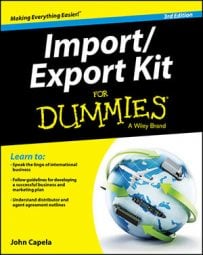As a general rule, the U.S. Customs Service doesn't require an importer to have a license or permit to import goods into the U.S. However, you may be required to have a license, permit, or other certification, depending on the commodity.
The importation of certain classes of merchandise may be prohibited or restricted. These prohibitions and restrictions have been put in place by U.S. Customs and specific government agencies (such as the U.S. Department of Agriculture, the FDA, and so on) to protect the economy and security of the U.S., protect American consumers, and preserve plant and animal life. Some items are also subject to quantity limits on imports (called quotas) or trade agreements.
The following list provides various classes of articles for which you need a license or permit from the responsible agency. (You can find the name of the responsible agency by talking to commodity specialist teams.)
Agricultural products
Alcohol and alcoholic beverages
Cheese, milk, and dairy products
Fruits, vegetables, and nuts
Insects
Livestock and animals
Meat, poultry, and egg products
Plants and plant products
Seeds
Tobacco-related products
Wood packing materials
Arms, ammunition, and radioactive material
Conflict diamonds
Consumer products — energy conservation
Commercial and industrial equipment
Household appliances
Consumer products — safety
Art materials (which may be toxic or flammable)
Bicycles and bicycle helmets
Cigarette lighters and multipurpose lighters
Fireworks
Flammable fabrics
Lead paint
Toys and children's articles
Electronic products
Radiation and sonic radiation-producing products
Radio frequency devices
Food, drugs, cosmetics, and medical devices
Gold, silver, currency, and stamps
Pesticides and toxic and hazardous substances
Textile, wool, and fur products
Trademarks, trade names, and copyrights
Wildlife and pets
Products such as textiles, clothing, automobiles, boats, radios, television sets, and medical devices are subject to special standards, declarations, certifications, marking, or labeling requirements, even if restrictions and prohibitions aren't in place. Additionally, merchandise can be inspected for fitness of use or freedom from contamination, and items can be subject to quotas.

